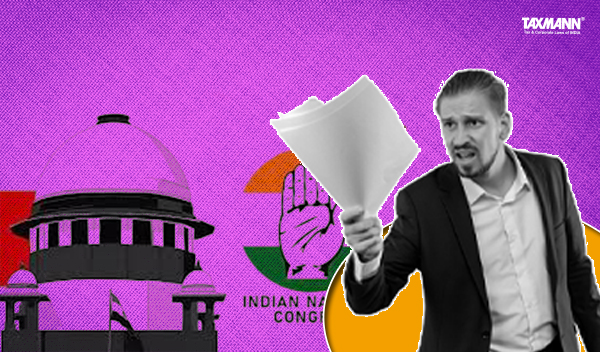Delhi ITAT Dismisses Congress Party’s Appeal to Stay Recovery of Outstanding Demand
- Blog|News|Income Tax|
- 3 Min Read
- By Taxmann
- |
- Last Updated on 12 March, 2024

Case Details: Indian National Congress All India Congress Committee v. DCIT - [2024] 160 taxmann.com 260 (Delhi-Trib.)
Judiciary and Counsel Details
-
- G.S. Pannu, Vice President & Anubhav Sharma, Judicial Member
- Vivek Krishna Tankha, Sr. Adv. Vipul Tiwari & Inder Dev Singh, Advs. for the Appellant.
- Zoheb Hossain, Vipul Agarwal, Sr. Standing Counsel, Sanjeev Menon, Jr. Standing Counsel, Vivek Gurnani, Rajat Sen & Waseem Ahmed for the Respondent.
Facts of the Case
Assessee-Indian National Congress (INC) is in a pickle. The political party has been slapped with a tax demand of over Rs. 100 crores. And the party is fighting tooth and nail to avoid paying the sum.
Assessing Officer denied the exemption to assessee, alleging that assessee filed its income tax returns after the due date and didn’t maintain a record of all donations received over Rs. 20,000. Further, the assessee party received donations in cash over Rs. 2,000 and didn’t maintain a record of these donations.
Assessee claimed that it duly filed return under section 139(4). Assessee argued that the recovery proceedings had been initiated with malafide intent. It says that the tax dept. is trying to time the recovery proceedings so that the party won’t have enough resources to contest the upcoming parliamentary elections.
The matter reached before the Tribunal.
ITAT Held
The Delhi Tribunal held that the Political Parties were required to file their income return in Section 139(4B) of the Act. The 3rd Proviso to Sec. 13A makes it mandatory for a Political Party seeking exemption under Section 13A to furnish its return of income for the relevant year on or before the due date under section 139.
The third Proviso contains the expression “the due date under section 139” and a plain reading of the provisions shows that the due date for Section 139 is defined in terms of Explanation 2 below Section 139(1) and that such ‘due date’ is not controlled by the provisions of sub-section (4) of Section 139, which merely permits the filing of belated returns.
Further, it should be noted that the recovery proceedings were initiated only after the assessee failed to pay 20% of the demand as per the option given to it by the Assessing Officer. The party had the option to pay 20% of the demand, and the balance of the demand would not be enforced during the pendency of the appeal before the CIT(A).
However, the party neither took the option of depositing 20% of the demand nor challenged the rejection of its stay application before any higher authority.
So, the Assessing Officer issued a letter seeking payment of the entire outstanding demand. And the assessee sought stay on the recovery of demand under Section 220(6) because of the pendency of the appeal before the CIT(A).
However, the CIT(A) dismissed the assessee’s appeal on 28th March 2023, against which an appeal was preferred before the ITAT only on 24th May 2023. Even at that stage, no stay on the recovery of demand was sought until the Assessing Officer initiated the instant proceedings under Section 226 (3) on 13th February 2024.
So, the allegations of malice made against the action of the Revenue for initiating recovery proceedings were baseless. No prima facie case has been made out by the assessee in the application for stay on the recovery of demand outstanding. Accordingly, the recovery notice issued by the Assessing Officer was justified.
Disclaimer: The content/information published on the website is only for general information of the user and shall not be construed as legal advice. While the Taxmann has exercised reasonable efforts to ensure the veracity of information/content published, Taxmann shall be under no liability in any manner whatsoever for incorrect information, if any.

Taxmann Publications has a dedicated in-house Research & Editorial Team. This team consists of a team of Chartered Accountants, Company Secretaries, and Lawyers. This team works under the guidance and supervision of editor-in-chief Mr Rakesh Bhargava.
The Research and Editorial Team is responsible for developing reliable and accurate content for the readers. The team follows the six-sigma approach to achieve the benchmark of zero error in its publications and research platforms. The team ensures that the following publication guidelines are thoroughly followed while developing the content:
- The statutory material is obtained only from the authorized and reliable sources
- All the latest developments in the judicial and legislative fields are covered
- Prepare the analytical write-ups on current, controversial, and important issues to help the readers to understand the concept and its implications
- Every content published by Taxmann is complete, accurate and lucid
- All evidence-based statements are supported with proper reference to Section, Circular No., Notification No. or citations
- The golden rules of grammar, style and consistency are thoroughly followed
- Font and size that’s easy to read and remain consistent across all imprint and digital publications are applied



 CA | CS | CMA
CA | CS | CMA
